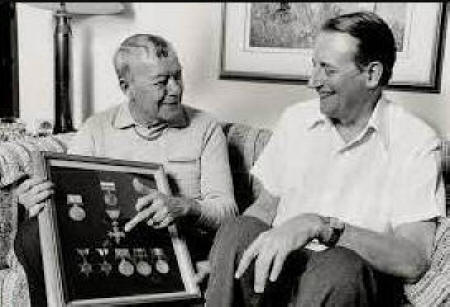

Partner Herbert Sutcliffe
Queer Places:
Princeton University (Ivy League), 110 West College, Princeton, NJ 08544
Spadina Rd, Toronto, ON, Canada
 Professor
Ralph Wormleighton (1921 - November 23, 2008) was a Canadian statistician. When same-sex marriage became legal in Ontario,
Herbert Sutcliffe and Ralph Wormleighton, his partner of 30 years, didn't rush to the altar. "We didn't see any point in our doing it. In terms of income tax, we were already regarded as a couple, and our wills and powers-of-attorney were drawn up to reflect that."
Professor
Ralph Wormleighton (1921 - November 23, 2008) was a Canadian statistician. When same-sex marriage became legal in Ontario,
Herbert Sutcliffe and Ralph Wormleighton, his partner of 30 years, didn't rush to the altar. "We didn't see any point in our doing it. In terms of income tax, we were already regarded as a couple, and our wills and powers-of-attorney were drawn up to reflect that."
Professor Wormleighton was a loyal and stalwart servant of all the activities he joined. He is remembered with respect and fondness by colleagues, students and friends. He sought to serve and in doing so avoided attention or acclaim. This remembrance is based on the comments offered by many he influenced including: Professors D. Clarke, D. Fraser, J. Repka, M. Stephens, and T. Rooney.
Ralph Wormleighton, graduated from high school shortly before the Second World War. Unable to attend university, he enrolled in the army. During the war he served in the Medical Corps initially in Italy and later in Europe. After the war, he was able to attend the University of Toronto through programs provided for veterans. The first two years were spent in study at a campus in Ajax. Ralph praised the education he received from the professors who participated in the program. After graduation, Ralph proceeded to a PhD at Princeton under the supervision of J. W. Tukey. The degree was awarded in 1955.
The records of the university indicate that he was appointed lecturer in the Department of Mathematics in 1953. There he taught for thirty years -- including the years after 1977 when statistics became a separate department. Ralph was an excellent lecturer, well-organized, clear, (the lecture notes taken by students at the time proved surprisingly useful). A great number of students who subsequently went on to most successful careers benefitted from his teaching.
In addition to teaching, Ralph was given many of the tough jobs involved in the operation of a department. He served as undergraduate secretary, associate chairman, and later in Statistics, as acting chairman. These are all jobs that require colleagues with the rare combination of careful efficient work and a calm, agreeable disposition. Such colleagues deserve our highest respect.
Ralph contributed to the literature of non-parametric methods, queueing, and a paper in the Annals which put a practical touch on Stein’s two-stage sampling paper. His greater contributions were to the application of statistics. After joining the University, he was involved in research for the Canadian Armament Research and Development Establishment at Valcartier. (At the time, his PhD supervisor was deeply involved in anti-ballistic missile development as was CARDE. Both men respected confidentiality and we may never know if they were aware of the other’s work.) Later Ralph was involved with the pioneers of computer traffic control. This work began with an organization that evolved from Traffic Researc to Kates Casciato and Shapiro to Kates, Peat Marwick. Many remember a highly popular lecture he gave on the topic. This applied experience informed his lectures which broadened the view of statistics of a generation of students.
Those fortunate to know him well, learned that Statistics was only part of his life. Ralph was an excellent cook and an accomplished classical pianist. He regularly gave recitals in his home at which he provided delightful food and exquisite performances. He was a perfectionist in many spheres.
His interest in music led to three essays on piano playing of which he was most proud. In one, he challenged the conventional wisdom that the sound of a piano note depends only on the force with which the hammer hits the string. Ralph explained how vibrations in the connections between the key and the hammer are transmitted to the string and showed how differences in sound could be demonstrated.
Ralph had a challenging personal life, surviving more than one partner. Those who had the privilege on knowing these most interesting men understood the depth of his loss. Ralph’s death has generated in many of his colleagues, students and friends, perhaps too late, a recognition of the great contributions Ralph made to our lives.
My published books: